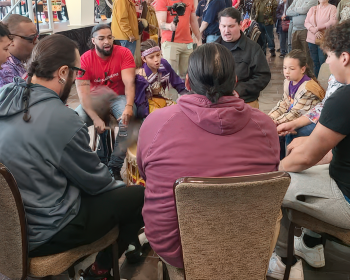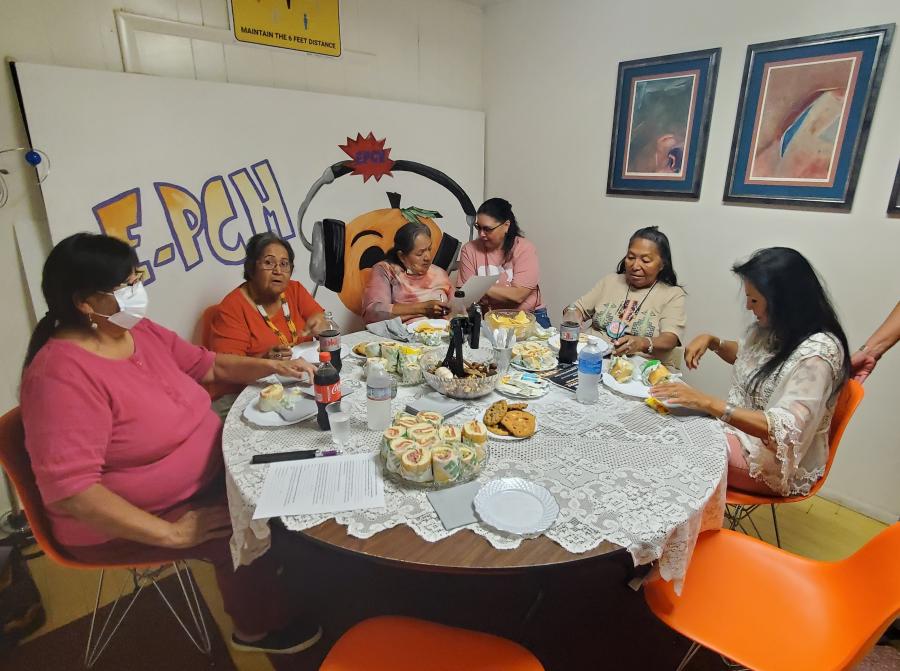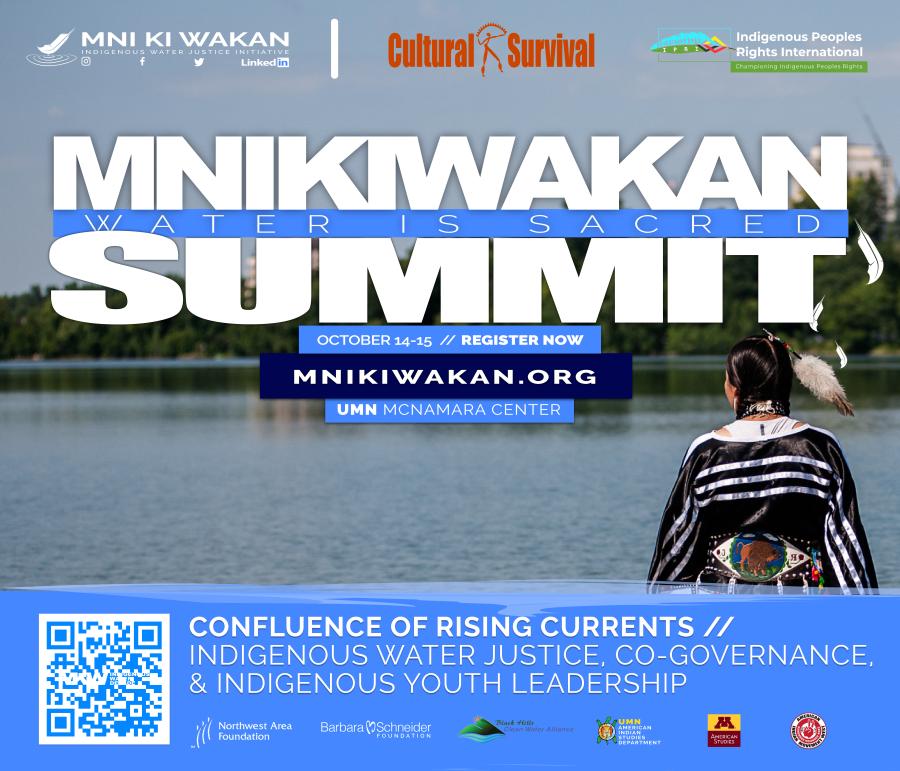
January 2012 marked four years since Cultural Survival launched Endangered Languages Program partnerships with critically endangered Native American language communities. Since Spring 2008, Cultural Survival’s grassroots collaborative of four local language program directors and administrators serving 6 tribally-run programs has raised nearly three quarters of a million dollars in direct support for five partner programs, while leveraging nearly $2 million in total new investments in language revitalization efforts. Activities funded include community outreach, curriculum development, master apprentice and other immersion methodologies which are yielding significant language fluency gains for many community participants.
As Cultural Survival’s Endangered Languages Program begins its fifth year of fundraising, networking, and advocacy in partnership with local tribal language programs across the U.S., we continue to receive numerous requests for partnership activities, training, and other resources, prompting an in-depth assessment and expansion process to accommodate additional communities and expand our working groups to include grassroots, regional, national, and international partners and advisors to our work. We will continue to work with our valued core partner programs in Alaska, Massachusetts, Oklahoma, and Wyoming, while adding diverse new organizations to our collective efforts. Read more about and meet our current advisors and partners at the links below:
[[{"type":"media","view_mode":"media_original","fid":"60709","attributes":{"alt":"","class":"media-image media-image-right","height":"1944","style":"width: 283px; height: 212px; margin: 10px; float: right;","typeof":"foaf:Image","width":"2592"}}]]
Northern Arapaho Language Lodge
A private donor contribution to the Northern Arapaho language Lodge in Ethete, Wyoming, facilitated recent purchases of new seating, educational toys, and kitchen supplies for the staff and preschool students attending this immersion classroom setting staffed almost entirely by first-language Arapaho-speaking elders. Elders also requested a new video camera to aid in expanding documentation and outreach efforts to parents and families.
[[{"type":"media","view_mode":"media_original","fid":"60705","attributes":{"alt":"","class":"media-image media-image-left","height":"324","style":"width: 282px; height: 152px; float: left; margin: 10px;","typeof":"foaf:Image","width":"600"}}]]
Qik’rtarmiut Alutiit Language Program at the Alutiiq Museum and Kodiak College
A small-grant to the Qik’rtarmiut Alutiit (Alutiiq People of the Island) Language Program at the Alutiiq Museum in Kodiak, Alaska, will fund a spring trip for youth and elders to a statewide Alaska-Native language and culture conference. To learn more about the efforts to revitalize the Alutiiq language, visit OurMotherTongues.org and read the new Cultural Survival Quarterly article “Recovering Indigenous Knowledge Systems in Alaska: Alutiiq Studies at Kodiak College and the Alutiiq Museum.”
[[{"type":"media","view_mode":"media_original","fid":"60706","attributes":{"alt":"","class":"media-image media-image-left","height":"2472","style":"width: 282px; height: 225px; margin: 10px; float: left;","typeof":"foaf:Image","width":"3296"}}]]Sauk Language Department
Recently awarded a renewal grant from the Endangered Language Fund, the Sauk Language Department of the Sac and Fox Nation in Oklahoma continues to strengthen and expand its team-based Master-Apprentice Program with multi-year funding provided by the U.S. Department of Health and Human Services’ Administration for Native Americans. Three young adult language apprentices spend more than twenty hours weekly with three participating first-language Sauk elders. Meet the apprentices at OurMotherTongues.org, visit the department’s website at TalkSauk.com, and read the article in the Cultural Survival Quarterly, “I love Sauk Language.” Watch interviews with Sauk Language Apprentices at Cultural Survival’s and Makepeace Productions’ new Our Mother Tongues website.
[[{"type":"media","view_mode":"media_original","fid":"60707","attributes":{"alt":"","class":"media-image media-image-left","height":"1063","style":"width: 283px; height: 188px; margin: 10px; float: left;","typeof":"foaf:Image","width":"1600"}}]]Wôpanâak Language Reclamation Project
Cultural Survival and WLRP met recently to plan for summer language youth education opportunities, and to revisit the screening and sales schedule for WE STILL LIVE HERE: ÂS NUTAYUNEÂN. The hour-long Anne Makepeace documentary this year raised nearly $5,000 for WLRP’s family immersion camp, and two-week summer youth language and culture camp. The educational film has been presented in over 100 venues nationally and internationally, and continues to make new festival, conference, and community appearances. Download the ITVS discussion guide edited by Cultural Survival here. See the full listing of past and upcoming screenings here. Join WLRP co-founder and director Jessie Little Doe Baird and assistant producer/researcher Jennifer Weston for a screening and panel discussion at the Peabody Essex Museum on Saturday, March 3 at the Salem Film Festival. Read more about the Wôpanâak Language Reclamation Project’s master apprentice program in Women the World Must Hear – Awakening a Sleeping Language on Cape Cod: The Wampanoag Language Reclamation Project.
[[{"type":"media","view_mode":"media_original","fid":"60708","attributes":{"alt":"","class":"media-image media-image-left","height":"2736","style":"width: 283px; height: 212px; margin: 10px; float: left;","typeof":"foaf:Image","width":"3648"}}]]Yuchi (Euchee) Language Project
Teachers at the Yuchi House recently received a mini-grant from Cultural Survival’s Endangered Languages Program thanks to a generous donation from the Chickasaw Nation of Oklahoma. The Euchee (Yuchi) Language Project has also begun summer planning and fundraising efforts to accommodate a near-doubling of student attendees in after-school language programming offered at the community center in Sapulpa, Oklahoma. New federal funding received last fall from the Administration for Native Americans has increased the language project’s visibility locally, as well as the number of teachers. Read more about the local efforts underway in a recent Cultural Survival Quarterly article by Euchee language apprentice and teacher Renée Grounds, The Yuchi House: A Storehouse of Living Treasure.



